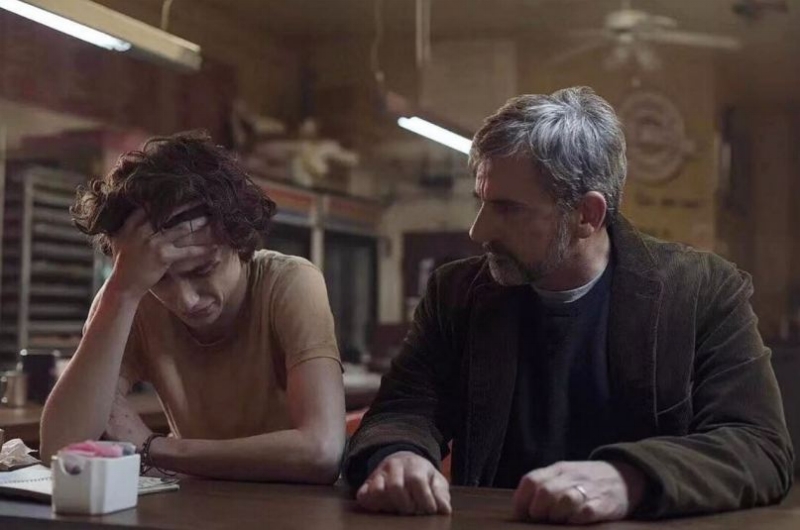BEAUTIFUL BOY
Directing: B-
Acting: B+
Writing: B-
Cinematography: B
Editing: B-
It might come across to some as being somewhere on the spectrum between disingenuous and self-righteous for me, a white guy, to declare Beautiful Boy the epitome of white privilege, but I can’t deny that I thought a lot about it while watching this movie.
I’ll be clear about this first off: the story of father and son David Sheff and Nic Sheff (Steve Carell and Timothée Chalamet, respectively) dealing with Nic’s persistent drug addiction is a worthy one. It even hits close to home, given that I do have a family member with a history of drug addiction, as many of us do — another family member even loaned me Nic’s memoir, Tweak, one of the two books on which this movie is based; the other is the book of the same title as the movie, written by David. I long planned to read it, and may yet, but still haven’t.
But there is also no denying what informs the very existence of those books, and by extension this movie: the expectation of empathy and a lack of judgment. And where does this expectation come from? This story is about an upper-middle-class, white family.
Late in Beautiful Boy, there is a scene with David and his wife Karen (Maura Tierney), attending an Al-Anon meeting, or something akin to it. They sit in silent resignation about Nic, as they listen to another woman deliver a monologue about having recently lost a loved one to an overdose. This is a clear example of David and Karen knowing empathy in the most tragic of ways, but here’s the thing: Where’s that woman’s movie? There’s a sort of sad irony to having seen Beautiful Boy right after seeing The Hate U Give, which pointedly addresses how institutionalized racism pushes black communities denied resources into drug dealing and addiction, and then blames them and denies them the empathy that Beautiful Boy assumes is a given for its characters. And even in The Hate U Give, the protagonist is a well-educated, stellar young woman who happens to witness the shooting of her best friend by a white cop. It’s far from the kind of “honest examination” of drug addiction that Beautiful Boy purports itself to be.
And strangely, Beautiful Boy doesn’t even bother to show us how the hell Nic got into drugs in the first place. What were the circumstances? Are we to suppose this kid, who had every conceivable advantage, tried every drug under the sun, and ultimately became addicted to crystal meth, simply by random chance? Presumably the memoir reveals that. This movie, on the other hand, tells the story of Nic’s relentlessly vicious cycle, getting clean and relapsing, over and over again, until his loving parents — including the mother who lives in another city, played by the unfortunately under-used Amy Ryan — are forced to accept that they are powerless to save their son from his own self-destruction.
To their credit, the performances are solid all around. I’m not sure that alone means you need to see this movie, however. I don’t regret seeing it, myself, and I suppose it has a usefulness as an indicator that other families in similar situations are not alone. (Again, I get back to this, though: that relatability is aimed squarely at white audiences, this movie’s couple of black characters in very bit parts notwithstanding.) It paints a woefully incomplete picture, with its ending title cards referring to the epidemic of meth addiction in this country. The vast majority of the people having this problem do not look like this family — hell, even the vast majority of white people with this problem don’t — and it says something that it’s this family’s story that was declared worth sharing. I’m all for feeling compassion for the Sheff family, and their story is a compelling one that leaves you wishing them the best. The attention they get is still at the expense of many others who are no less deserving.
So should we talk about the subtext here?
Overall: B-

